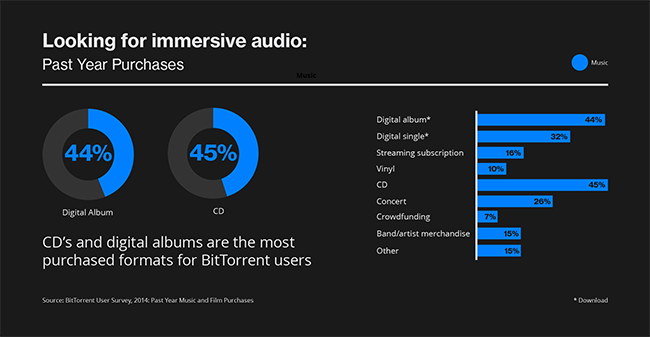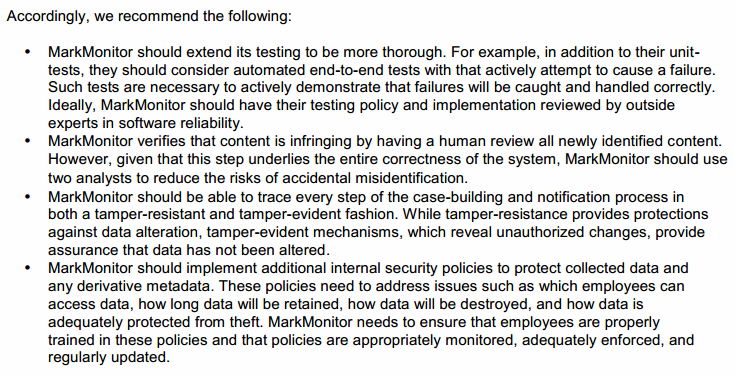[Most Recent Entries] [Calendar View]
Friday, November 21st, 2014
| Time | Event |
| 9:23a | BitTorrent Users are Avid, Eclectic Content Buyers, Survey Finds
However, studies have found that file-sharers are often more engaged than the average consumer, as much was admitted by the RIAA back in 2012. There’s little doubt that within those millions of sharers lie people spending plenty of money on content and entertainment. To get a closer look, in September BitTorrent Inc. conducted a survey among a sample of its users. In all, 2,500 people responded and now the company has published the results. The figures aren’t broken down into age groups, but BitTorrent Inc. informs TF that BitTorrent users trend towards young and male. Music From its survey the company found that 50% of respondents buy music each month, with a sway towards albums rather than singles (44% v 32%). BitTorrent users are reported as 170% more likely to have paid for a digital music download in the past six months than Joe Public. Citing figures from the RIAA, BitTorrent Inc. says its users are also 8x more likely than the average Internet user to pay for a streaming music service, with 16% of BitTorrent users and 2% of the general public holding such an account. Perhaps a little unexpectedly, supposedly tech-savvy torrent users are still buying CDs and vinyl, with 45% and 10% respectively reporting a purchase in the past 12 months. BitTorrent Inc. says that the latter represents users “engaging and unpacking art as a multimedia object”, a clear reference to how the company perceives its BitTorrent Bundles. On average, BitTorrent Inc. says its user base spends $48 a year on music, with 31% spending more than $100 annually.  Movies When it comes to movies, 47% of respondents said they’d paid for a theater ticket in the preceding 12 months, up on the 38% who purchased a DVD or Blu-ray disc during the same period. Users with active movie streaming accounts and those making digital movie purchases tied at 23%, with DVD rental (22%) and digital rental (16%) bringing up the rear. All told, BitTorrent Inc. says that 52% of respondents buy movies on a monthly basis with the average annual spend amounting to $54. More than a third say they spend in excess of $100.  So do the results of the survey suggest that BitTorrent Inc.’s users have a lot to offer the market and if so, what? “The results confirm what we knew already, that our users are super fans. They are consumers of content and are eager to reward artists for their work,” Christian Averill, BitTorrent Inc.’s Director of Communications, told TF. “BitTorrent Bundle was started based on this premise and we have more than 10,000 artists now signed up, with more to come. With 90% of purchase going to the content creators, BitTorrent Bundle is the most artist friendly, direct-to-fan distribution platform on the market.” It seems likely that promoting and shifting Bundles was a major motivator for BitTorrent Inc. to carry out the survey and by showing that torrent users aren’t shy to part with their cash, more artists like Thom Yorke will hopefully be prepared to engage with BitTorrent Inc.’s fanbase. Also of note is the way BitTorrent Inc. is trying to position that fanbase or, indeed, how that fanbase has positioned itself. While rock (20%), electronic (15%) and pop (13%) took the top spots in terms of genre popularity among users, 23% described their tastes as a vague “other”. Overall, 61% of respondents described their musical tastes as “eclectic”. “[Our] users are engaged in the creative community and they have diverse taste. They also do not define themselves by traditional genres. We feel this is a true representation about how fans view themselves universally these days. They are eclectic,” Averill concludes. While monetizing content remains a key focus for BitTorrent Inc., the company is also making strides towards monetizing its distribution tools. Last evening uTorrent Plus was replaced by uTorrent Pro (Windows), an upgraded client offering torrent streaming, an inbuilt player, video file converter and anti-virus features. The ad-free client (more details here) is available for $19.95 per year. Source: TorrentFreak, for the latest info on copyright, file-sharing and anonymous VPN services. |
| 5:45p | U.S. Copyright Alert System Security Could Be Improved, Review Finds
The Copyright Alert System’s main goal is to inform subscribers that their Internet connections are being used to share copyrighted material without permission. These alerts start out friendly in tone, but repeat infringers face a temporary disconnection from the Internet or other mitigation measures. The evidence behind the accusations is provided by MarkMonitor, which monitors BitTorrent users’ activities on copyright holders’ behalf. The overseeing Center for Copyright Information (CCI) previously hired an impartial and independent technology expert to review the system, hoping to gain trust from the public. Their first pick, Stroz Friedberg, turned out to be not that impartial as the company previously worked as RIAA lobbyists. To correct this unfortunate choice, CCI assigned Professor Avi Rubin of Harbor Labs to re-examine the system. This week CCI informed us that a summary of Harbor Labs’s findings is now available to the public. The full review is not being published due to the vast amount of confidential information it contains, but the overview of the findings does provide some interesting details. Overall, Harbor Labs concludes that the evidence gathering system is solid and that false positives, cases where innocent subscribers are accused, are reasonably minimized. “We conclude, based on our review, that the MarkMonitor AntiPiracy system is designed to ensure that there are no false positives under reasonable and realistic assumptions. Moreover, the system produces thorough case data for alleged infringement tracking.” However, there is some room for improvement. For example, MarkMonitor could implement additional testing to ensure that false positives and human errors are indeed caught. “… we believe that the system would benefit from additional testing and that the existing structure leaves open the potential for preventable failures. Additionally, we recommend that certain elements of operational security be enhanced,” Harbor Labs writes. In addition, the collected evidence may need further protections to ensure that it can’t be tampered with or fall into the wrong hands. “… we believe that this collected evidence and other potentially sensitive data is not adequately controlled. While MarkMonitor does protect the data from outside parties, its protection against inside threats (e.g., potential rogue employees) is minimal in terms of both policy and technical enforcement.” The full recommendations as detailed in the report are as follows:  The CCI is happy with the new results, which they say confirm the findings of the earlier Stroz Friedberg review. “The Harbor Labs report reaffirms the findings from our first report – conducted by Stroz Friedberg – that the CAS is well designed and functioning as we hoped,” CCI informs TF. In the months to come the operators of the Copyright Alert System will continue to work with copyright holders to make further enhancements and modifications to their processes. “As the CAS exits the initial ramp-up period, CCI has been assured by our content owners that they have taken all recommendations made within both reports into account and are continuing to focus on maintaining the robust system that minimizes false positives and protects customer security and privacy,” CCI adds. Meanwhile, they will continue to alert Internet subscribers to possible infringements. After nearly two years copyright holders have warned several million users, hoping to convert then to legal alternatives. Thus far there’s no evidence that Copyright Alerts have had a significant impact on piracy rates. However, the voluntary agreement model is being widely embraced by various stakeholders and similar schemes are in the making in both the UK and Australia. Source: TorrentFreak, for the latest info on copyright, file-sharing and anonymous VPN services. |
| << Previous Day |
2014/11/21 [Calendar] |
Next Day >> |
 Each month 150-170 million Internet users share files using the BitTorrent protocol, a massive audience by most standards. The common perception is that these people are only interested in obtaining content for free.
Each month 150-170 million Internet users share files using the BitTorrent protocol, a massive audience by most standards. The common perception is that these people are only interested in obtaining content for free.